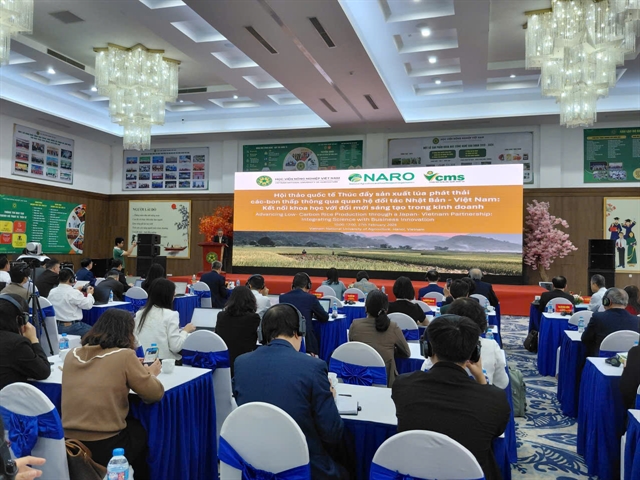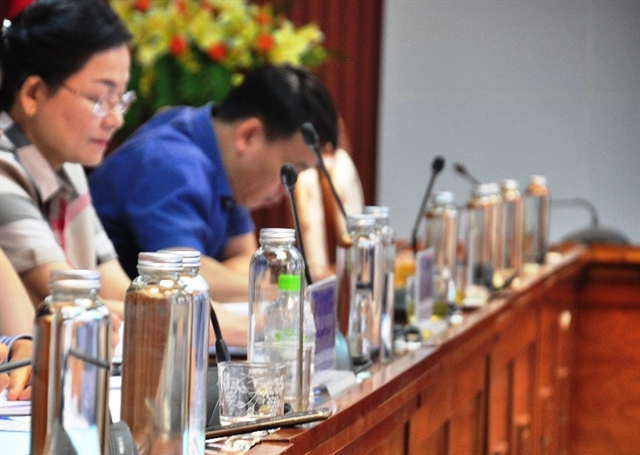 Environment
Environment

Việt Nam is the fourth largest plastic polluter in the world. Each year, up to 700,000 tonnes of plastic waste is thrown away and not recycled properly.

|
| Single-use water bottles are replaced by glass bottles at conferences in the office of Quảng Nam Province's People's Committee. Photo namtramy.gov.vn |
Việt Nam is the fourth largest plastic polluter in the world. Each year, up to 700,000 tonnes of plastic waste is thrown away and not recycled properly.
By the year 2025, the country is targeting zero disposable plastic waste, but to do that, government departments must act fast to improve recycling habits.
Phan Tuấn Hùng, director of the Ministry of Natural Resources and Environment’s Legal Department spoke with Tuổi Trẻ (Youth) newspaper about the issue and how government departments must set the example for everyone else to follow.
The Prime Minister's has instructed Government offices and agencies to be pioneers to stop using disposable plastic products in 2020. How will the work be implemented?
In the process of developing the draft directive to curb the use of plastic products at Government offices and agencies, the ministry has evaluated the abuse of plastic products, especially plastic bags and single-use plastic products, and found alarming figures of waste which has caused serious marine pollution.
The Prime Minister has instructed ministers, heads of ministerial-level agencies, government agencies, People's Committees of provinces and cities to issue the directive or plans to reduce, classify, collect, reuse, and recycle plastic waste from October.
The ministries, branches and localities have been required to take the lead in reducing plastic waste and single-use plastic use. Disposable banners, single-use bottles, cups, straws at work and during conferences, seminars, anniversaries, are discouraged.
According to the plan, the whole country targets not to use disposable plastic products by 2025.
Could you tell us how the classification of plastic waste will be implemented for recycling purposes?
Waste must be classified at source at the Government offices and agencies. The model of classifying waste, in which plastic waste and other recyclable wastes should not be mixed with organic waste, must be carried out and expanded among offices and agencies.
Classification of waste at source is stipulated in the Law on Environmental Protection in 2005. However, the work has not been done effectively during the past 15 years.
In some localities, waste classification is carried out at source, but on a small scale and stopped after the international cooperation projects were completed.
Therefore, the Prime Minister has instructed the agencies and offices to be exemplary and pioneering right from the waste classification at source, so that the habit will be implemented at home.
The Prime Minister has also instructed ministries, branches and localities to disseminate and train officials, civil servants and public employees to raise awareness on sorting and collecting plastic waste.
What measures will be taken to evaluate and monitor the curbing of disposable plastic products at Government offices and agencies?
The Prime Minister has instructed the heads of ministries, branches and localities to issue the directive or action plan as well as the annual evaluation of the performance results.
The Directive clearly states that ministries, branches and localities shall annually report on the implementation of the work. The Ministry of Natural Resources and Environment will be in charge of reporting the results to the Prime Minister.
There are a number of agencies and units, especially international organisations, actively and drastically engaged in this work. However, many Government offices and agencies are still using single-use plastic products. The restriction in the single-use plastic will bring huge benefits both in terms of the environment and the economy.
Agencies, units and localities should be encouraged to use the budget to buy eco-friendly products. As a result, it will more or less change the production activities of businesses who will focus on eco-friendly products rather than disposable plastic ones. — VNS
BOX: PhD Đặng Kim Chi of Vietnam Association for Conservation of Nature and Environment:
"State agencies are using a lot of disposable plastic products such as cups, water bottles, plastic bags and packages. Therefore, it is necessary to issue an instruction that requires ministries, branches, localities, agencies and offices to take the lead in restricting the use of disposable plastic products.
"The pioneering behaviour of State agencies in changing habits will significantly reduce plastic waste. It also shows that State agencies are concerned about urgent problems in environmental protection.
"The leaders must be role models and say no to non-biodegradable and single-use plastic products. At conferences, seminars, events and activities of every unit, there should be no disposable plastic items.
"From that, officers, public servants, and employees will spread the change of behaviour to their families and the community."




